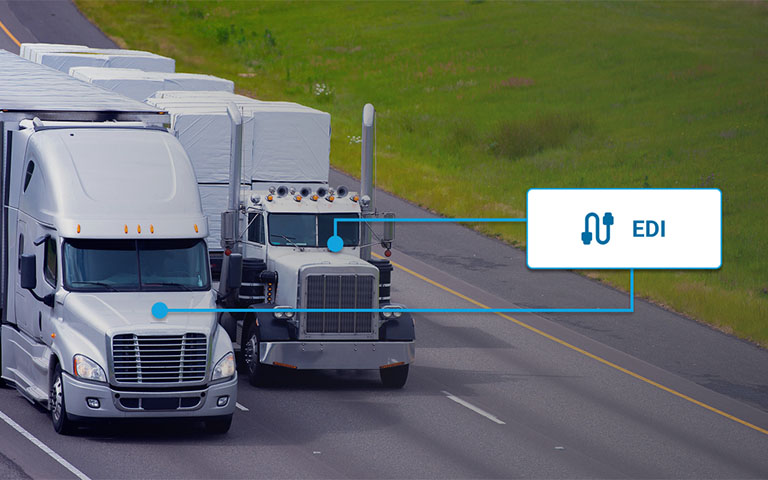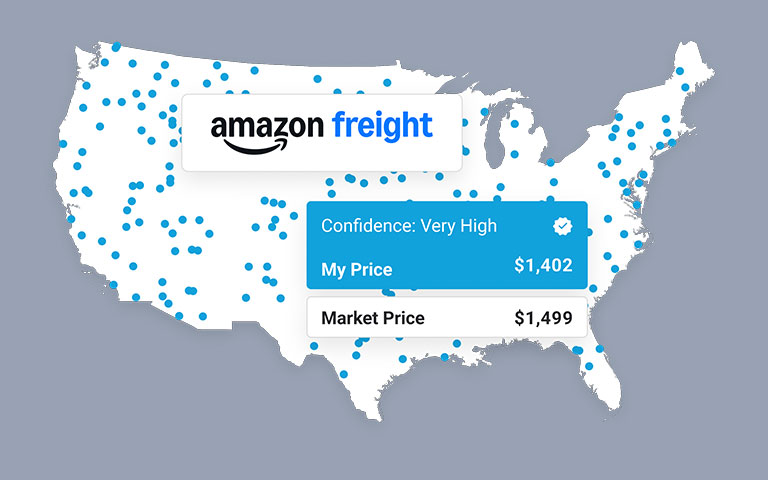From Thunderstorms to Cloud Solutions: Technology Users Discuss Supply Chain Management at Infor Velocity Days

Key Takeaways

- Infor Velocity Days delivered fresh opportunities to discuss supply chain management and energy, giving Infor users a forum to tackle challenges like AI adoption, tech transformation fatigue, and operational bottlenecks—all while sparking new ideas for what’s possible.
- Infor showcased products like Infor Industry AI Agents, Infor Process Intelligence, and Infor Process Mining. These tools give companies the power to automate decisions, visualize workflow bottlenecks, and turn ERP data into clear, actionable insights to help companies bridge the gap between hype and real, measurable impact.
- Shipwell’s TMS and Infor are a powerful combo: by layering real-time transportation data inside the Infor ecosystem, customers gain sharper visibility, proactive insights, and supply chain leaders the kind of automation that turns a cloud migration into true end-to-end efficiency.
Each year, Infor Velocity Days brings expert connection, peer networking and success stories that inspire. As first-time sponsors and attendees of the event, the Shipwell team got caught up in the crackling energy (thunderstorms included), spread out (four people meant we could attend more sessions) and absorbed what mattered most to supply chain leaders.
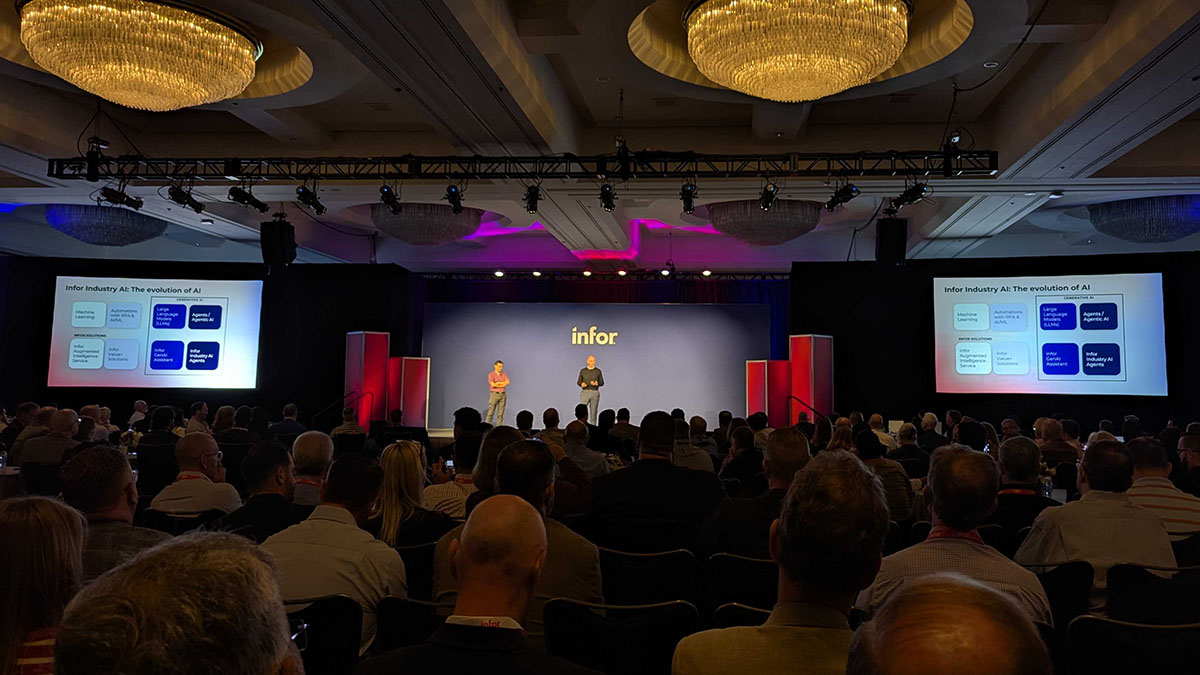
Across manufacturing and distribution, Infor users were generally curious about the latest advancements in AI, process intelligence, and cloud-based solutions. This interest also came with a level of hesitancy, as migrating technology to the cloud is still considered overwhelming by some.
With insights in hand, we started asking attendees about the challenges they specifically face in logistics. And here’s what we uncovered.
1. Make AI Meaningful: Filling the “Value Void”
95% of companies are seeing zero return on their AI investments. Infor’s recent research found that despite organizational investment, conquering the “value void” – the disconnect between the value and the reality of what AI can deliver – takes shifting mindsets and expert partnerships.
At Velocity, we heard AI defined in 4 types: Automation, Assistant, Advisor, and Agent. Each with their own use cases and ROI. By leveraging industry specific solutions and data sets, Infor aims to provide real-world context to their AI solutions, to accelerate adoption and RO and bridge the “value void.”
Looking ahead, business rules-based management could be the next frontier of development for AI agents. A business rule, in the context of AI, are clear instructions to define how decisions should be made within a business process. Once Infor clients set their business rules, their AI will make recommendations based on their existing rules – or even propose new business rules based on Infor process mining – to ensure consistency and accuracy optimization recommendations.
At Shipwell, we’re equally passionate about using AI to improve productivity. Our Track and Trace AI Worker, particularly when coupled with the In-App AI Assistant, enables logistics teams to anticipate challenges, act decisively, and unlock new levels of performance. Our TMS layers real-time transportation data into Infor’s ERP systems, providing the visibility and AI-powered insights needed to make proactive, informed decisions during unexpected disruptions like geopolitical events, weather, or system outages.
2. Infor Process Mining: A Digital Audit, Minus the Headaches
In a poll at one session, 56% admitted “managing tech transformation” is their top challenge for 2026. “Process Mining” is one of the solutions Infor brought forth to help with that, and a key piece of the Infor Velocity Suite. To simplify, think of process mining as:
- Compiling customers ERP/CloudSuite data
- Completing a digital audit that compares ideal user workflows against actual processes day-to-day
- Outputting a visual that clearly shows irregularities–ie: opportunities for optimization or change.
During this session, an actual process mined-visual from a diversified food company was displayed. The comparison and insights pulled from data seemed obvious to their team, but elsewhere in the room, conversations around operational workflow ignited – challenging long-held assumptions and showing where the next big efficiency gains are hiding.
For businesses managing complex logistics, Shipwell’s TMS adds another layer of value. By integrating transportation data with Infor, we help our customers streamline workflows, reduce touchpoints, and deliver goods faster while maximizing ROI.
3. The Push to the Cloud: Why It’s Time to Make the Leap
Infor made a strong case for moving from on-premise systems to industry cloud solutions–because if customers want to unlock the ROI of AI (and honestly, who doesn’t?), the cloud is non-negotiable. That ROI comes with a stunning success rate: 100% of customers who made the transition saw measurable business impact.
While moving from on-premise to cloud-based systems can seem daunting, Infor makes it easier with Infor Leap–their fixed-fee, fixed-timeline cloud ERP implementation program. To accomplish this, their team reviews an organizations’ on-premise environment and current state processes. It’s through this exercise they pinpoint opportunities and prescribe the appropriate cloud-based solution that will yield the highest results.
Once an organization completes its conversion to the cloud, Shipwell’s TMS picks up where your ERP left off, bringing transportation, visibility, and automation into one connected experience. Think of it as extending your Infor investment–turning your “push to the cloud” into a leap toward end-to-end efficiency.
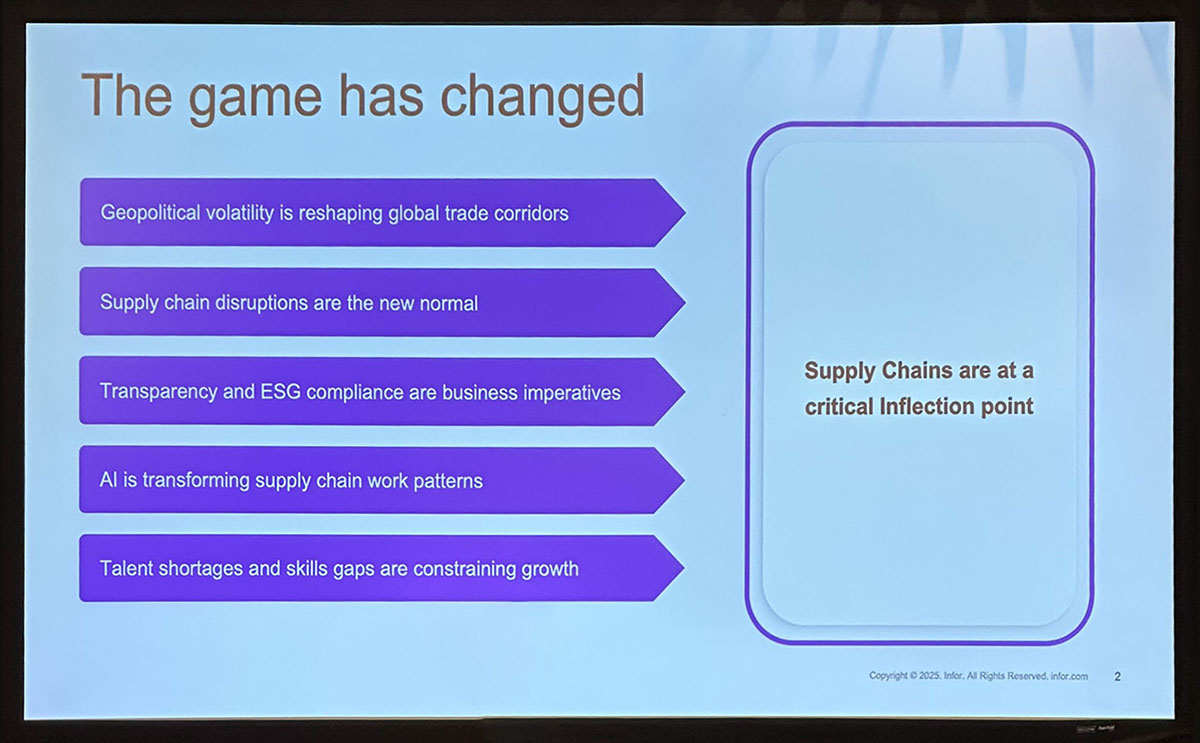
Why It Matters for You (and What’s Next)
As global trade lanes face a predicted 30% shift by 2035, flexible, scalable supply chain management solutions are table stakes. If your organization isn’t already preparing, you risk being left behind. Infor made it crystal clear: their future–and their users–is built on cloud-based technology (just as Shipwell has been since inception.)
Infor and Shipwell share DNA: solve real problems, innovate fast, and make it easy for leaders like you to sleep at night. Whether you’re navigating the transition to Infor CloudSuite, leveraging AI for critical event management, or seeking to optimize your supply chain workflows, Shipwell is here to help.
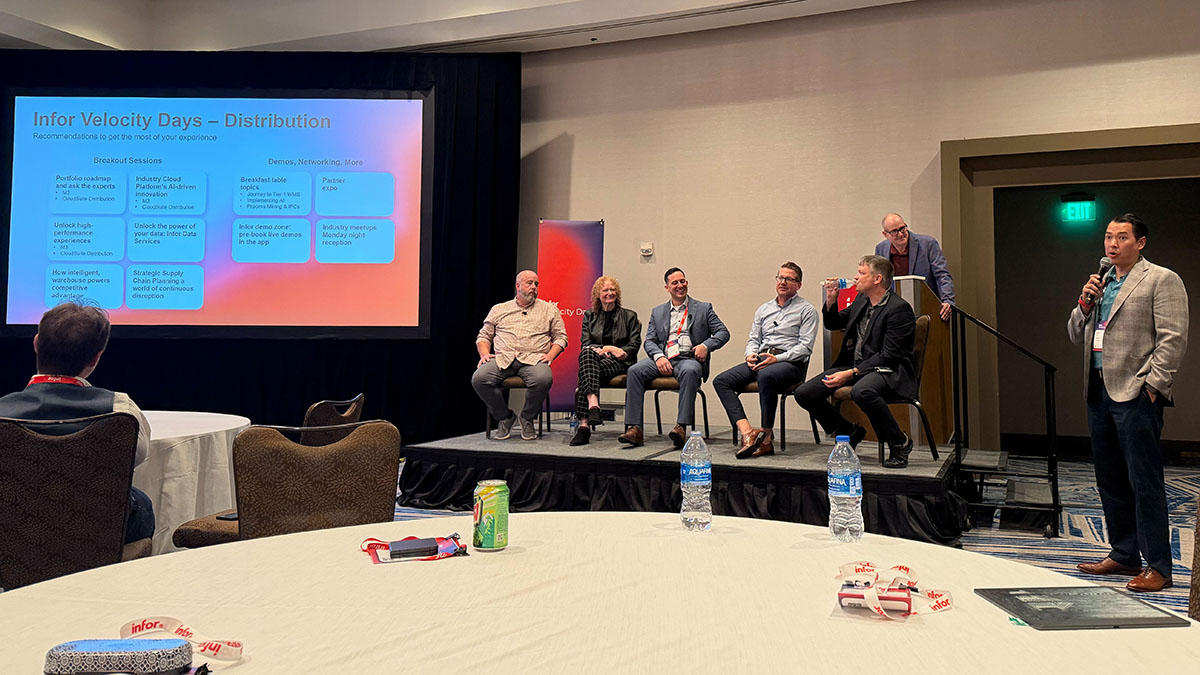
Ready for the Next Step?
If Velocity Days taught us anything, it’s this: the future belongs to those who act.
- Still stuck wrestling spreadsheets? Here’s how to knock them out.
- Want to see how Shipwell plus Infor can cut costs, boost performance, and keep your customers happy? Drop us a line.
- Curious about how easy API integration can really be? We’ll show you.
Frequently Asked Questions
Shipwell’s TMS connects directly to Infor’s ERP and CloudSuite via API, layering real-time transportation data and AI-powered insights into your existing workflows. This integration enables proactive decision-making and streamlines logistics operations without manual data entry.
The integration provides end-to-end shipment visibility, and efficiency gains through the automation of routine tasks and error reduction by connecting our transportation management platform directly to your Infor instance. This creates a single source of truth for managing shipments as they move through the supply chain.
Shipwell’s AI-powered Track and Trace Worker and In-App AI Assistant work alongside Infor’s Industry AI Agents to anticipate disruptions, automate workflows, and provide actionable insights—helping you bridge the gap between AI potential and real-world results.
Both platforms are built for flexibility and scalability, supporting rapid adaptation to market shifts and disruptions. By integrating logistics and ERP data in the cloud, you gain the agility and visibility needed to stay ahead in a changing supply chain landscape.


.svg)





